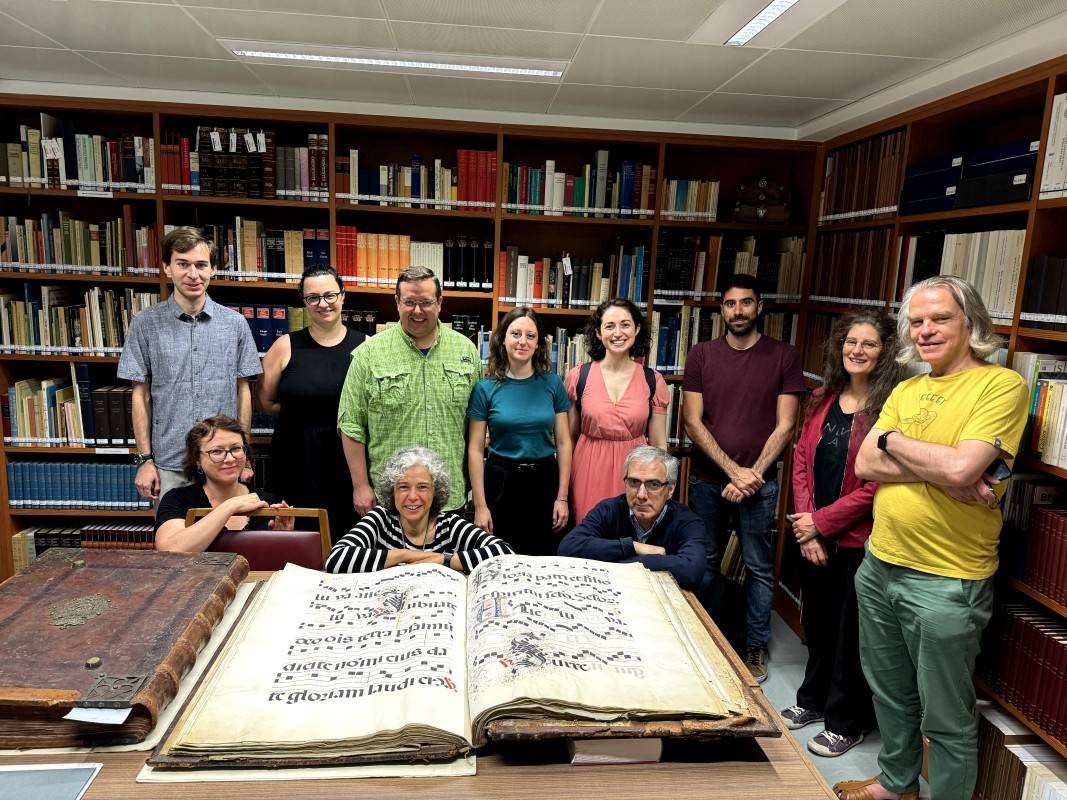Our Terms & Conditions | Our Privacy Policy
From the Bulgarian Academy of Sciences to Cambridge and Regensburg – young talent in musicology Kalina Tomova
Born on May 24, Kalina Tomova is among the most active and successful young musicologists in Europe. From a very young age, Kalina has shown her music talent, playing the piano, singing in the Bulgarian National Radio Children’s Choir. She graduated from the First English High School in Sofia and continued her education in the National Academy of Music “Prof. Pancho Vladigerov”. She graduated with three majors: opera singing, vocal pedagogy and musicology. Since the beginning of this year, Kalina has been a researcher at the Faculty of Music at the University of Cambridge. She is one of the members of a scientific group led by Prof. Catherine A. Bradley, studying the musical variants of the liturgical verse Benedicamus Domino. In February 2025. Kalina Tomova also won funding in the prestigious European Union program for international postdoctoral fellowships “Marie Curie”, which gives young scientists the opportunity to work on their own projects.
We ask her why she did not seek opportunities for higher education outside Bulgaria about a decade ago.
“I knew that if I stayed in Bulgaria, I could get high-quality education – especially in music. It was not a problem for me to stay here and I do not regret in any way that I stayed at the Academy of Music. It gave me the opportunity to develop in a way that is perfect for me.”

But what are the prospects for a young scientist specializing in musicology in Bulgaria?
“I had a stable period in which I expected that I would most likely stay at the Institute,” Kalina says. “But later it became clear to me that due to my personal life I would prefer to apply for other positions abroad… Last summer a competition was announced for Cambridge. I know the project leader – Prof. Catherine A. Bradley, who won 2 million euros from the European Research Council to analyze Benedicamus Domino. This is a short verse that is said (or sung) at the end of each of the liturgical hours during the day, as well as at the end of the mass in Advent and during Lent. This verse was said many times a day and therefore has many musical variations.”
One can learn a lot from Kalina about the two famous British universities – Oxford and Cambridge, “Being a member of a college brings many privileges, but the most important thing is that you have a social environment in college. I could also conduct the research from Bulgaria, but I am in Cambridge so that I can make contacts, so that I can meet people. A seminar is organized every week at the faculty, which I always try to go to, even when the topic is not particularly interesting to me. I think that perhaps the most valuable thing in our career as researchers is our contacts… This type of work is not done in isolation.”

And what awaits her after she finishes working in Prof. Bradley’s team?
“In the summer of 2024, I also submitted an application for Marie Curie – the European Union’s program for international postdoctoral fellowships. I decided to try at the University of Regensburg, as there is a good professor there – Katelijne Schiltz, who deals with notation and theory. It is important to choose the right organization and supervisor for the Marie Curie postdoctoral fellowships. In February, I received a message that I would have this funding. This is significantly more prestigious than Cambridge, as in Cambridge I am working on someone else’s project. In Regensburg I will be working on my own project, which I have developed.”

And is there a future in our country for people who are involved in science and art?
“I think they have a future here. Honestly, looking at what’s happening across the ocean right now, we’re in a much better position. The fact that we have the Bulgarian Academy of Sciences at all is an extremely privileged position. I think the fact that the Bulgarian Academy of Sciences existed even before our current modern state existed is very telling. Indeed, when I talk to some of our colleagues in the West and tell them that I did my doctorate in an institution that deals only with research, they find it interesting, because there are very few such institutions in the world. For example, the Bavarian Academy of Sciences is one of them. But in the English-speaking world, this doesn’t exist, because there the students are the ones who pay the salaries of the professors and researchers. In most cases, if a person wants to do research, they have to teach… In other words, the fact that we have purely research opportunities here is a very rare and wonderful chance. I hope that some future government will not try to erase it, as there have been such attempts… There are many jokes, of course, how even if they close down the BAS and stop their salaries, they will continue to go to work… I hope they won’t close down BAS!”.
Author: Tsvetana Toncheva
Publication in English: Alexander Markov
Photos: Tsvetana Toncheva, personal archive of Kalina Tomova, sofiapress.com
Последвайте ни и в Google News Showcase, за да научите най-важното от деня!
Images are for reference only.Images and contents gathered automatic from google or 3rd party sources.All rights on the images and contents are with their legal original owners.



Comments are closed.